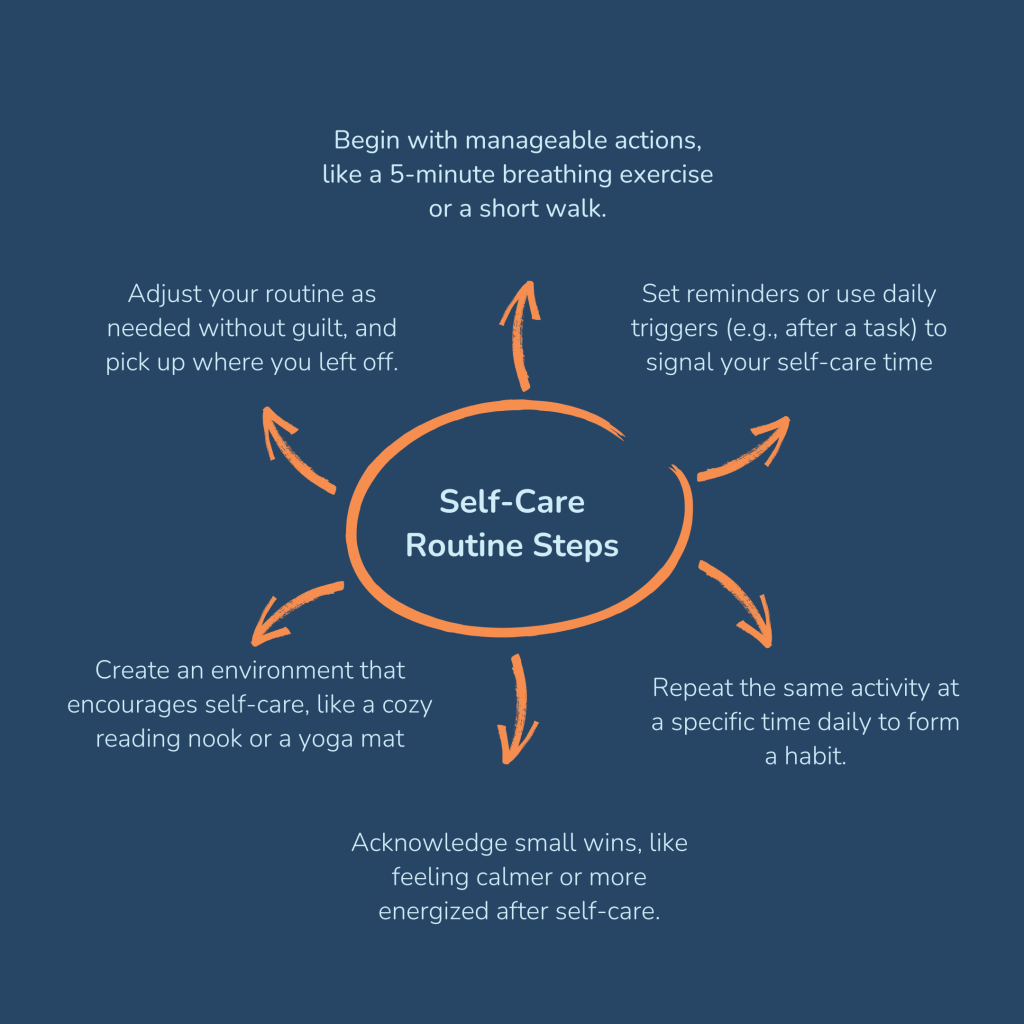Let self-care be your resolution this year. To stick to it, make sure you start small and celebrate your successes and achievements—even the small ones. I will discuss some self-care tips and explain how you can make self-care a routine—a routine that you will actually follow and not forget after a few days.
How to Do Self-care as a Caregiver?
1. Take Breaks In Between:
2. Be Self-compassionate:
3. Practice Deep Breathing:
Controlled deep breathing is a self-care tip recommended by many professionals. It doesn’t take more than 10 minutes and can do wonders to reduce your stress and avoid burnout. Here is one of the many breathing routines you can practice every day:
- Find a comfortable seat or a floor cushion to sit on.
- Close your eyes and relax. Your thoughts may distract you but that’s normal.
- Focus on your breathing.
- Breathe in through your nose. Hold it in for a few seconds, and then exhale.
- You can complete this cycle in fifteen seconds. If it is uncomfortable you can reduce this time.
- Repeat and continue for ten minutes. You can use a timer to keep track of time
4. Eating and Sleeping Well:
One of the main reasons for caregiver burnout and stress is the lack of proper meals. It is common for you to ignore your diet and not have regular meals. Research involving 400,000 individuals found that skipping breakfast is linked to higher levels of depression, stress, and anxiety in adults.
Lastly, you must get enough sleep every day. Sleep relaxes the body and regulates its functions. To improve your quality of sleep, take some time to relax before sleeping. You can do some yoga, breathing exercises, or meditation to enhance your sleep quality. Reduce your alcohol intake as it can negatively affect your sleep.
5. Mind-Body Exercises:
Meditative exercises, such as yoga and tai chi can reduce stress and help with clearing up the mind. They are easy to do and can be carried out at any time. You may not be able to identify when you are stressed. These exercises can help you increase your awareness of your mind and body and their responses, and avoid burnout and stress.
6. Stay Connected:
Caring for others can sometimes leave you feeling isolated, as it’s easy to become so absorbed in your responsibilities that you lose touch with friends and family. Staying socially connected, however, is one of the most effective ways to support your own well-being.
Make an effort to stay in touch with loved ones, even if meeting in person isn’t possible. Online platforms offer a great way to connect when physical meetings are difficult or unsafe. If your social circle feels limited, consider joining one of the many support networks available across Canada specifically designed to help you find community and understanding.
7. Share Your Responsibilities:
After a long caregiving day, you can ask for help from family. It can be related to chores or other household tasks so you can take some time to rest or take a power nap. For example, your sibling doing your grocery shopping can be one example.
Also, this can be seen from another angle, which is asking for help from seniors in your field. They may offer valuable tips and tricks that can make your tasks easier and more manageable. This way, you can share your mental burden and learn effective strategies for handling challenging situations.
8. Set Boundaries:
It’s okay to say no. Protecting your time and energy is essential to avoid feeling overwhelmed. Setting boundaries helps you focus on what’s manageable without stretching yourself too thin. Be honest and clear about your limits—it’s not selfish; it’s necessary. When you respect your own boundaries, you’ll be in a better place to care for others while also taking care of yourself.
Bonus Tips:
- Think about the times when you and your client bonded well and had a wonderful time together.
- Appreciate the small things and celebrate them—this is what will keep you going, and the fun of life will keep circling around.
- Take credit for your hard work and accept compliments.
- List three things you are grateful for in your life. This practice is proven to be effective, as shared by Becky Field, whose father and brother suffer from Huntington’s disease.
How to Make Self-care a Routine?
The psychology behind building a routine revolves around habit formation, consistency, and how our brains adapt to repeated actions. When we do something consistently, our brain creates stronger neural pathways, making the action feel automatic over time.

Wrapping Up:
When people tell you to give some time to yourself, and the thought crosses your mind that if they were in your shoes, they wouldn’t have handled it as well—you might not be wrong. Not everyone can manage stress and burnout easily. You’re doing good enough, but it could get even better for your mental, physical, and emotional health if you start prioritizing self-care.
People might stop bugging you with their advice. You can even share with them how you’re taking care of yourself nowadays!
FAQ’s
1. Why is self-care important for caregivers?
Self-care is vital for caregivers as it helps prevent burnout, reduces stress, and maintains physical and emotional health. By taking care of yourself, you ensure that you can continue to provide high-quality care to your loved ones.
2. How can caregivers find time for self-care amidst their responsibilities?
Incorporating self-care into a busy caregiving schedule can be challenging but is achievable. Caregivers can prioritize self-care by scheduling short breaks, delegating tasks, and asking for help from family or friends. Even small acts of self-care, like a 10-minute walk, can make a difference.
3. What are some effective self-care activities for caregivers?
Engaging in activities such as exercise, mindfulness, journaling, connecting with friends, or pursuing hobbies can significantly benefit caregivers. These practices help reduce stress and improve overall well-being.
4. How can caregivers manage feelings of guilt when taking time for themselves?
It’s common for caregivers to experience guilt when focusing on their own needs. However, self-care is not selfish; it’s necessary. By maintaining your health, you’re better equipped to care for others. Seeking support from caregiver groups can also provide reassurance and shared experiences.
5. What resources are available to support caregiver self-care?
Various resources are available, including caregiver support groups, both in-person and online, which provide a platform to share experiences and advice. Organizations like the Family Caregiver Alliance offer educational materials and support services. Additionally, healthcare providers can connect caregivers with local resources, such as respite care services and counseling, to assist in managing caregiving responsibilities.





